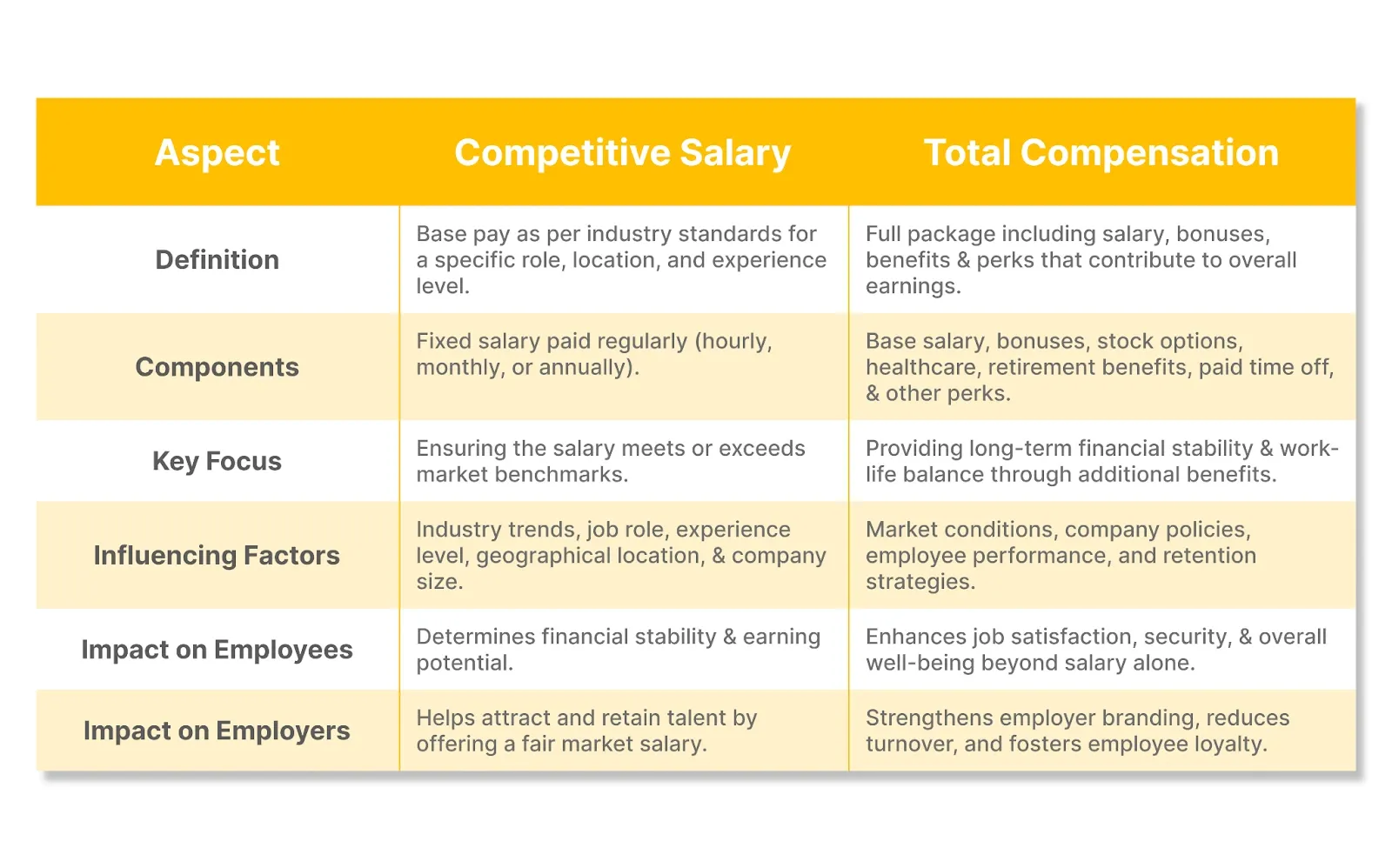
Determining whether a salary is competitive is a challenge for both employers and employees. Companies must balance financial constraints with the need to attract and retain skilled professionals, while employees often question whether their compensation reflects their market value.
A competitive salary is not a fixed figure. It varies based on industry trends, geographic location, job role, and skill demand. Employers that fail to assess and adjust salary structures risk losing talent to organizations offering better compensation.
At the same time, employees who lack awareness of market benchmarks may settle for salaries that do not match their expertise and contributions. A survey found that 73% of employees would consider leaving their current job for a higher paycheck, with an average pay increase of 13.3% being sufficient to tempt them away.
Understanding what defines a competitive salary and how it impacts workforce stability and business success is essential for creating fair and sustainable compensation structures.
This article explores the factors that shape competitive pay, the difference between salary and total compensation, and strategies for staying aligned with market standards.
A competitive salary refers to compensation that aligns with market rates for a specific role, industry, and location. It is neither below nor significantly above the standard pay for similar positions, ensuring fair compensation while maintaining financial sustainability for employers.
Unlike a market rate, which reflects the average salary for a role, a competitive salary considers additional factors such as company size, industry trends, and total compensation. It is designed to attract skilled professionals while ensuring internal pay equity.
Competitive salaries fluctuate based on demand for specific skills, economic conditions, and evolving industry benchmarks. High-demand roles, such as those in technology and healthcare, often see rapid salary increases. Other industries maintain more stable compensation structures.
While base pay remains the foundation of a competitive salary, total compensation is also crucial in determining overall employee satisfaction and retention. This includes bonuses, benefits, stock options, and perks.
Suggested Read: A Comprehensive Guide to Compensation Analysis – Learn how competitive pay, salary benchmarking, and equity-driven strategies help attract and retain top talent. Read more.
Multiple factors influence a competitive salary, each shaping how compensation is structured across different industries and roles. Beyond base pay, factors such as industry trends, geographical location, skill demand, and company size play a crucial role in determining what constitutes competitive compensation.
Understanding these elements helps employers set fair wages and ensures employees assess their market value accurately.
Salary benchmarks vary across industries due to differences in revenue models, profitability, and demand for specialized skills. Sectors such as technology and finance often offer higher compensation. Industries with lower margins tend to provide competitive salaries through benefits and career growth opportunities.
Higher salaries are typically offered for roles requiring advanced expertise, specialized knowledge, or leadership responsibilities. Professionals with significant experience, in-demand skills, or niche expertise often command higher pay compared to entry-level employees in the same industry.
Larger organizations often provide structured salary bands, performance bonuses, and extensive benefits, making total compensation more competitive. Startups and small businesses may offer lower base salaries but compensate through stock options, flexible work arrangements, or rapid career progression.
Cost of living and regional salary trends significantly impact compensation. Metropolitan areas with higher living expenses generally offer higher salaries compared to smaller cities or rural locations. Companies operating across multiple regions must consider localized salary adjustments to maintain competitiveness.
Emerging skills and evolving job roles influence salary structures. Rapid advancements in technology, regulatory changes, and economic shifts can drive salary fluctuations, making it essential for employers to stay updated on industry compensation trends.
Competitive salaries are dynamic and require continuous evaluation to align with market expectations. Organizations that fail to adapt risk losing skilled professionals, while employees who stay informed can make better career and salary decisions.
Suggested Read: Understanding the Components of Total Rewards – Discover how salary, benefits, incentives, and career development opportunities work together to create a competitive compensation package. Read more.
As industries evolve and market conditions shift, continuous salary evaluation remains essential for both businesses and professionals. Competitive compensation is not a one-time calculation but an ongoing process that drives long-term career growth and organizational success.
A competitive salary is a key factor in attracting and retaining talent, but it is only one part of a broader compensation package.
Total compensation includes additional financial and non-financial benefits that enhance an employee’s overall earnings and job satisfaction.
Understanding the distinction between salary and total compensation is essential for both employers and employees when evaluating pay structures.

While a competitive base salary may attract candidates, total compensation plays a significant role in long-term job satisfaction and retention. Companies that offer robust benefits can remain competitive even if their base salaries are slightly lower than industry benchmarks.
Therefore, employees considering job offers must assess the overall compensation structure rather than just the salary figure.
Assessing whether a salary is competitive requires evaluating multiple factors beyond base pay. Compensation structures are influenced by industry benchmarks, location, job responsibilities, and market demand for specific skills.
A salary that seems fair in one industry or region may be below market expectations in another. Employees need to compare their earnings against industry benchmarks, while companies must ensure their compensation structures align with market standards to attract and retain talent.
Market data is crucial in determining competitive pay. Salary surveys from sources like Payscale, Glassdoor, and industry-specific reports provide insights into average salaries for specific roles across various locations and experience levels.
Salaries vary significantly based on job responsibilities, required skills, and professional experience. Competitive salaries reflect these variations and ensure fair compensation based on skill level and industry demand.
Compensation is often influenced by cost of living and regional salary trends. Major metropolitan areas offer higher salaries to match increased living expenses, while smaller cities and remote positions may have adjusted pay scales.
Analyzing salaries for similar roles across different organizations provides a clearer picture of whether a salary is competitive. Factors such as company size, revenue, and business model influence pay structures, making it essential to compare compensation within the same industry.
Beyond salary, total compensation—such as bonuses, stock options, and benefits—must be factored into any competitive salary analysis. A slightly lower base salary may still be competitive if the overall package includes strong financial incentives, work-life balance perks, and career development opportunities.
Determining salary competitiveness requires ongoing assessment as market conditions and industry trends evolve continuously. Regular benchmarking ensures fair pay for employees while helping companies maintain a strong position in talent acquisition and retention.
Suggested Read: Total Rewards Examples: Building a Competitive Compensation Strategy – Explore real-world examples of total rewards packages that go beyond salary to attract and retain top talent. Read more.
Beyond offering market-aligned salaries, organizations that invest in total compensation—such as performance-based incentives, professional development opportunities, and employee well-being programs—create a more attractive workplace.
Offering a competitive salary requires more than just matching industry benchmarks. Companies must develop structured compensation strategies that align with market trends, business goals, and employee expectations. Maintaining salary competitiveness involves continuous assessment, internal equity, and adapting to economic changes.
Market research and salary benchmarking help organizations determine competitive pay for different roles. Employers use compensation data from industry reports, job boards, and salary surveys to set fair salaries.
How CompUp Helps: CompUp simplifies salary benchmarking by providing real-time compensation data tailored to industry standards, job roles, and locations. By leveraging CompUp’s analytics, companies can make data-driven salary decisions, ensuring competitive pay structures that attract top talent.
Establishing well-defined salary bands ensures fair and transparent pay distribution. A structured pay scale reduces disparities while accommodating career progression.
How CompUp Helps: CompUp streamlines pay structure optimization by offering tools to create and manage salary bands based on market data. Its compensation planning features enable organizations to align pay with industry benchmarks while ensuring internal fairness.
Periodic salary reviews help companies stay competitive in the job market. Adjusting salaries based on inflation, company performance, and employee contributions supports workforce retention.
How CompUp Helps: CompUp automates salary reviews by analyzing market trends and internal pay data. With customizable salary review cycles and real-time analytics, HR teams can make proactive salary adjustments that align with business goals.
Competitive salaries should maintain fairness within an organization. Internal pay equity prevents wage disparities that could lead to dissatisfaction or turnover.
How CompUp Helps: CompUp’s internal pay equity tools help organizations conduct salary audits and identify potential pay gaps. By ensuring fair compensation practices, companies can maintain employee trust, reduce turnover, and promote a culture of transparency.
Suggested Read: Conducting a Pay Equity Analysis: Addressing the Gender Pay Gap – Explore how organizations can assess and close pay disparities through structured equity analysis and data-driven salary adjustments. Read more.
Competitive salary strategies require balancing market expectations and financial sustainability. Companies that proactively evaluate and adjust their pay structures strengthen employee satisfaction, engagement, and long-term business success.
CompUp’s compensation management platform provides the data-driven insights needed to build and maintain competitive salary structures.
Even when a salary aligns with market rates, negotiation remains a crucial step in securing the best possible compensation. Understanding how to approach salary discussions helps professionals maximize their earning potential. With the right approach, employees can maximize their earning potential, and employers can retain top talent through well-structured, competitive pay strategies.
Employees who research market trends and present a strong case based on skills, experience, and contributions are more likely to receive competitive offers.
Negotiating a desired salary requires preparation, confidence, and the right timing. Whether securing a new job or requesting a raise, strategic negotiation can lead to better pay outcomes. Every negotiation may not lead to immediate salary adjustments.
However, building a case for future pay increases or alternative incentives ensures long-term financial growth. Entering salary discussions with a clear understanding of industry benchmarks, personal achievements, and company compensation structures strengthens the ability to advocate for fair pay.
Total compensation extends beyond base salary, encompassing benefits, bonuses, stock options, and perks that contribute to overall financial security and job satisfaction. Competitive pay reflects an organization's commitment to fair pay and an employee’s ability to recognize and advocate for their worth.
Tools like CompUp simplify compensation management by providing real-time salary data, helping organizations refine pay structures and ensure fairness. CompUp simplifies salary management with real-time compensation insights, pay structure optimization, and internal pay equity tools.
Whether refining salary bands, conducting market comparisons, or automating salary reviews, CompUp empowers organizations to confidently attract and retain top talent.
Book a demo with CompUp to discover how data-driven insights can transform your salary decisions.
How often should companies review and adjust salaries?
Salaries should be reviewed at least once a year, with adjustments based on market trends, cost of living, and company performance. High-growth industries may require more frequent assessments to stay competitive.
Is a higher salary always better than a strong benefits package?
Not necessarily. While base salary is important, total compensation (bonuses, stock options, healthcare, retirement plans, paid leave, etc.) often provides more value in the long run. A lower base salary with strong benefits can still be a competitive offer.
What are red flags that indicate a salary offer is not competitive?
Can remote employees expect the same salaries as in-office employees?
It depends. Some companies adjust salaries based on location, while others maintain uniform pay scales regardless of where employees work. Remote workers in lower-cost regions may receive slightly lower salaries than those in high-cost cities.
How can companies balance paying competitive salaries while maintaining profitability?
Companies can maintain competitive pay without overextending budgets by:

Co-founder & CEO, CompUp
Anurag Dixit, founder of CompUp, is a seasoned expert in all things compensation and total rewards. With a deep understanding of the current compensation trends, his vision is to help companies create fair, transparent, and effective compensation strategies.
Revolutionizing Pay Strategies: Don't Miss Our Latest Blogs on Compensation Benchmarking